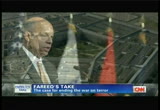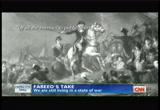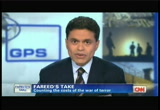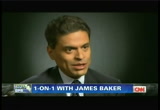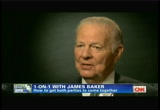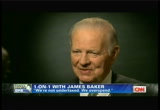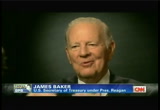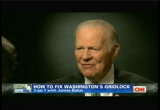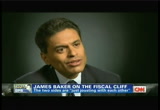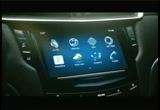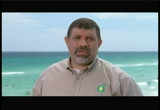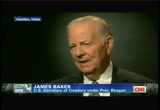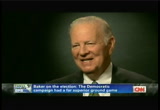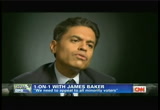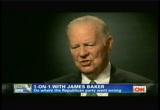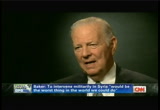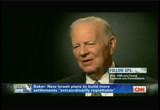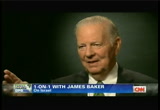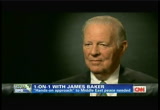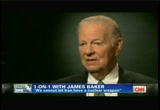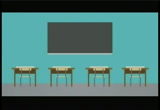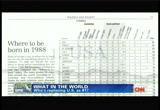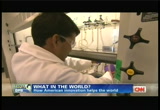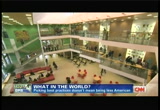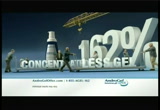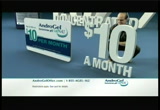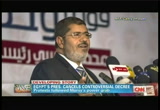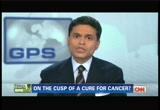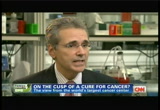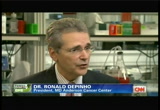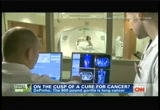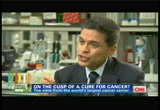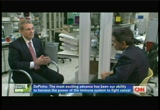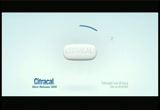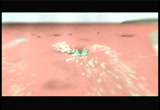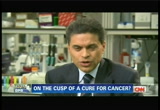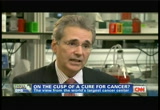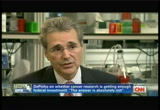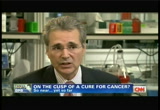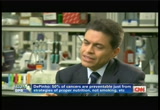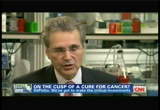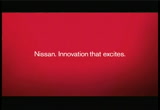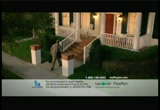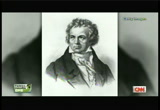tv Fareed Zakaria GPS CNN December 9, 2012 10:00am-11:00am EST
10:00 am
thank you for watching "state of the union." i'm candy crowley in washington. head to cnn.com/sotu for analysis and extras. if you missed any part of today's show, find us on itunes. just search "state of the union." fareed zakaria is next from here and parts of the united states. this is gps, the global public square. welcome to you around the states and the world, i'm fareed zakaria. we have a very important show. first up, with washington as an impasse, an exclusive conversation with unof america's greatest deal makers. james bake eric former secretary of state, former secretary of treasury, former white house chief of staff on how to stay off the fiscal cliff and on what his party should learn from the last election. next, when the u.s. aimed high in the 1960s, we sent a man to the moon. with a similar effort, we can
10:01 am
now cure cancer. that whees the head of the largest cancer center in the world, houston's m.d. anderson says. you want to hear why we're so close to success and yet so far. and merge has lost its numb were one standings in lots of areas from competitiveness to education. the new number one in most cases, a scandinavian country. what is the secret sauce? we'll dig into it. but first here's my take. as we debate whether the two parties can ever come together and get things done, here's something president obama could probably do by himself that would be a single accomplish money of the his presidency. end the war on tar rohr. for the first time since 9/11 an official has raised the prospect. johnson said in a speech to the oxford last week as the battle against al qaeda continues,
10:02 am
there will be come a tipping point at which so many of the leaders and operatives of al qaeda and its affiliates have been killed or captured such that as al qaeda as wi know it has been effectively destroyed. at that point, he says, our efforts should no longer be considered an armed conflict. you might not realize it, but we're still living in a state of war. this is the longest since the civil war, world war i, world war ii. it grants the president and federal government extraordinary authorities, effectively extends civil liberties for anyone the government deems an enemy and keeps us in a permanent war footing in all kinds of ways. end this situation should be something that would appeal to both left and right. james madison, the author of the constitution, was clear on this topic. of all the enemies to public enemy, he wrote war is the most draw might because it comprises
10:03 am
and develops the germ of in other. of all the enemies to public lynn earth war is perhaps the most directed because it compromise and develops the germ of err other. war is the parent of armies. in addition we have had the largest expansion of the federal government since world war ii. dana priest and will yaj arkin have documented that the u.s. government has built 33 new building complexes for the intelligence bureaucracies alone, occupying 17 million square feet, the equivalent of 22 u.s. capitals or three pentagons. the department of homeland security itself employs almost one quarter of a million people. of course, there are new branches out there. those terrorists should be captured or killed, but we have
10:04 am
done this before and we can do it again in the future under more normal legal circumstances. it will mean that the administration will have to be more careful and perhaps have more congressional involvement for certain actions like drone strikes. it might mean it will have to charge some of the people in guantanamo and try them in military or civilian courts. but is all this bad? so have we reached a point where we might consider shifting from emergency wartime powers? well, a new report is out this week, a new global terrorism index. it goes from 2002 to 2011. it shows that terrorism went up from '02 to '07 largely because of the conflicts in afghanistan, pakistan, and iraq, but has been declining ever since. and surveying the situation by region, the report finds that the part of the world with the fewest incidents of terrorism has been north america. for more on this, readmy columbia in "the washington post." there's a link to it on the web
10:05 am
side. cnn.com/fareed. let's get started. -- captions by vitac -- www.vitac.com he was centrally involved in historic bipartisan deals to reform our tax system, our immigration system, social security. james baker was ronald reagan's most important lieutenant. so who better to tell us how to get a deal done in washington today? i spoke with him at the baker center at rice university in houston. mr. secretary, pleasure to have you on. >> thank you so much. pleasure to be with you. >> so you've been chief of staff, secretary of treasury, you know this moment. the president is negotiating with congress over a budget. what would you do if you were to put yourself in the place that tim geithner is or john boehner is. how would you play this? >> well, i think it's very important that the -- that the
10:06 am
top levels of both parties are involved in the negotiation and that they get together as soon as possible because what we really need is grand bargain to deal with the state of our economy. we're fiscally bankrupt. if we didn't have the dollar, we might be greece. we have a deal with our debt bomb. giev tot face the fiscal cliff that's coming in a couple of weeks. >> so you know what both sides are saying. the president is saying there's no way to make the math work without raising the rates for the top income earners and that the republicans should give in on this. >> yeah, yeah. >> do you think he's right? >> well, i understand that position. that was the position he took during the campaign. but what has to happen in my view, you've got to have everything on the table. yo view to have revenue increases. now, how you get those revenue increases was an item of discussion during the campaign. it are be an item of discussion
10:07 am
during the negotiation. i for one think you could get there in way that would promote economic growth by eliminating -- by bronding the tax base, by eliminating loopholes and deductions. the truth of the matter, fareed, is we're not undertaxed as americans. we overspend. i think everybody would agree we overspend. that's why we have this debt to gdp over 100%. fars as the eye can see, absence poultcy changes. whatever you do, you first have to agree what the level of debt to gdp ought to be and there'll be a negotiation about it. one of the things that the republicans are going to need in this negotiation it seems to me is assurance that if they raise taxes and once they've raised taxes that they will, in fact, get the spending cuts because in past years they've agreed to tax
10:08 am
increases, and those spending cuts never come. >> did that happen to reagan? >> it happened in reagan's first term. we agreed do some spending cuts that we didn't get. it happened under george h.w. bush's presidency. so it's really important in order to engender our confidence and trust, particularly on the part of the republicans that they know if they agree to tax increases, which they're going to have to do, revenue increases, which they're going to have to do, that they have spending cuts. how do you get there? >> you get there by agreeing on what the spending to gdp should be, and say once it goes over that then you'll have across the board spending cuts. that produces votes. that's one way. the other way is if you raise
10:09 am
taxes as a part of a grand bargain, you could provide that those taxes would be rescinded automatically and would sunset in the event you exceeded that cap of spending to gdp, whatever it is, 20%, 21%, wherever it is, 22%. >> on the spending side, even if you were to do the kind of sequestration you were talking about, if you look at the median term, certainly the long term -- >> yeah. >> -- all of the increases in spending are essentially around health care. it's medicare and medicaid that are out of control. what would you do about that. >> well, you've got to fix it. you've got to -- you've got to have entitlements on the table because entitlements are the biggest part of our spending problem. defense has to be on the table. everything has to be on table. you have to begin this any dpoesh yags by agrees there are knoll going to be any preconditions.
10:10 am
even's going to be on the table. you have to also agree nothing will be decided until everything is decided. you also have to agree everything will be done in confidence and bhoofrd behind closed doors. it's extraordinarily difficult when you try to do it. it looks like the campaign is continuing. that's where we are today. we did social security totally plievt behind closed doors. >> so you think the way they're doing it is just wrong. >> i don't think they'll ever get this this way. they're jousting each other. each side is repeating its campaign talking points. you need to have a serious confidenti confidential, substantial negotiation by top levels of both parties. >> you are a political animal. looking at this, this situation, what is your gut? who's going to win? >> i don't know. who we ought to be talking about
10:11 am
is not who's going to win but how can the country win? look. in the short term, if we go over the cliff. it's conceivable that people will say, oh, well, that's the republican's fault and the president won. the fact of the matter is if we don't get this problem solved and it's going to take leadership by the top leader in the country, and that's the president of the united states. if we goedon't get it revolved, he's going to bare the burden. if the economy doesn't recover, people are going to hold the party responsible. >> we'll be right back. i'm going to ask him what his lesson from the last election is, what he took from it, and also some thoughts on foreign policy, when we come back. [ male announcer ] citi turns 200 this year.
10:12 am
in that time there've been some good days. and some difficult ones. but, through it all, we've persevered, supporting some of the biggest ideas in modern history. so why should our anniversary matter to you? because for 200 years, we've been helping ideas move from ambition to achievement. and the next great idea could be yours. ♪
10:13 am
bp has paid overthe people of bp twenty-threeitment to the gulf. billion dollars to help those affected and to cover cleanup costs. today, the beaches and gulf are open, and many areas are reporting their best tourism seasons in years. and bp's also committed to america. we support nearly 250,000 jobs and invest more here than anywhere else. we're working to fuel america for generations to come. our commitment has never been stronger.
10:15 am
with odor free aspercreme. powerful medicine relieves pain fast, with no odor. so all you notice is relief. aspercreme. . we're back with james baker, former secretary of state, former secretary treasurer, former chief of staff, everything. you watched the last election. i know because we talked. you ran in two campaigns. what did you make of it? >> i thought the election was going to be closer than it ended up being. i thought looking at it from the outside that the republicans had a decent chance of winning. i think the two most important things that happen thad defeated that were the very divisive
10:16 am
primary we had to endure before with 22 debates and a period between the end of the primary season and the beginning of the general election where the democrats were able to paint governor romney as something that he really isn't in my view and the republicans' side of the screen were silent because they had to wait till they got their general election money. and then the ground game. i think the democratic campaign had a probably very far superior campaign to the ground campaign. there's something that this election campaign tells us that needs to be done for my party, for us as a party. i think it's really important that we be seen to be the party of hope, optimism, and opportunity. that's what ronald reagan taught
10:17 am
us, instead of gloom and doom. we need to be positive. we need to appeal to those voter groups that we had trouble with. we need to apeelt to all minority voters, in particularly hispanic and asian voters. we need to have a credible and comprehensive immigration plan that we can put forth out there. we need to talk about urban issues and fact the fact that we don't -- we didn't get the votes we needed from urban areas. we didn't get the votes and don't get the votes from women. there we need to focus on our economic conservatives rare than our associate conservatives because a lot of those issues cut against us in the general election. aoug we ought to also be seen as a strong national party of security, yes, but not the party of war. >> talk about that. what did you think of the primaries, even with governor romney and the china bashing or on iran.
10:18 am
where do you think the wents went down? >> i don't think they're wrong on iran. i happen to believe we can't let iran acquire a nuclear weapon. we can talk about that later. i don't think it was substantively right to talk about december igniting china as a currency man in later on the first day in office. that's not going to solve the problem. that's not going to cure our trade sef sit with china. we need to save more in this country and we deed to get a handle on this great big debt bomb that we've got out there if you want to soothe that problem. ronald reagan didn't get into any war. we had a police action in eight years. that was it. yeah, you've got to be strong, maintain a strong national defense, fight against budget cuts and so forth, but unless
10:19 am
there's a very large national interest involved sometimes it's very counterproductive to engage in these overseas events. that would be the worst thing in the world we could do in my opinion. we should support the syrian opposition politically, diplomatically, economically, but not militarily brks but that's a slippery slope once you get into it. >> not even no-fly zone? >> when you do that, you have to take out the anti-aircraft batteries at risk. his government is going to fall. i think the policy that the administration is following on syria is absolutely the right policy to follow and i think the american people are going to
10:20 am
demand more and more that there be a significant before we engage. >> let me ask you about last week's news about israel deciding that in response to it, they're going to build settlements which would essentially make a contiguous -- snienk that's extraordinarily regrettable and regrettable for israel because israel cannot continue to be both a democratic and a jewish state if it stays in occupation of all of those lands. the demographics are such that that can't happen. so they're risking their status as both a democratic and jewish state. what are they going to choose? are they going to choose to be a jewish state or a democratic state. in a two-state solution it would be really extraordinarily sad if settlement activity got so rampant and so extensive that it
10:21 am
closed the opportunity for a two-state solution. >> you're the last administration that really applied pressure on this issue. do you think the obama administration should be doing more to try to press israel? >> well, i think what the obama administration needs do if they -- you know, the middle east is in chaos right now, and israel's going to be affected by that. and it's going to be affected in my view adversely by that. so i think what the administration needs to do is before more hands on and try to promote arab/israeli peace. that involves a whole lot more things than just settlements, and i think it was a mistake, for instance, for president obama in the first term to make -- fight on settlements. evan everybody in the united
10:22 am
states don't want settlements but it was a mistake for him to go out and say no morriset morrisetteleme morrisettelement. as soon as it was push back, they caved. if you're going to take that position, you don't case. i think what's needed is a hands-on approach involved everything. not just settlements, but everything el. get the parties back to the table-talking east. it's an axiom. if there not peace talks going on. >> finally in iran do, you think obama's administration policy, which is pressure, sanctions, tightening the screws, ads well as forcing the cyber attacks, are they doing enough? would you do something differently? >> they're doingering i thing they can do, and i think the policy is absolutely the right
10:23 am
policy. they're doing things covertly as well as you know. the samgss are beginning to show some evidence of biting. at the end of the day if none of that works, if they start enriching beyond 20%, if they kick out iran and the inspectors and go back to the program they suspended back whenever it was, 2006, if any of those things happen, then i think we just have to do what we have to do because we cannot let iran have a nuclear weapon not because of the threat so much to israel or the united states or the montana arab allies but because of the prolive nation. we've gottet the capability f of financially acquiring it. we can't have it happen.
10:24 am
>> james baker, pleasure to have you on, sir. >> thank you. >> that was james baker, the former secretary of state, former secretary of trashry. up next "what in if the world. scandinavia always comes out on top. why? and what can we learn from them? searching for a bank designed for investors like you? tdd#: 1-800-345-2550 schwab bank was built with all the value and convenience tdd#: 1-800-345-2550 investors want. tdd#: 1-800-345-2550 like no atm fees, worldwide. tdd#: 1-800-345-2550 and no nuisance fees. tdd#: 1-800-345-2550 plus deposit checks with mobile deposit. tdd#: 1-800-345-2550 and manage your cash and investments tdd#: 1-800-345-2550 with schwab's mobile app. tdd#: 1-800-345-2550 no wonder schwab bank has grown to over 70 billion in assets. tdd#: 1-800-345-2550 so if you're looking for a bank that's in your corner, tdd#: 1-800-345-2550 not just on the corner... tdd#: 1-800-345-2550 call, click or visit to start banking with schwab bank today. tdd#: 1-800-345-2550 yeah we both relieve coughs, sneezing, aches, fevers. and i relieve nasal congestion.
10:25 am
overachiever. [ female announcer ] tylenol® cold multi-symptom nighttime relieves nasal congestion. nyquil® cold and flu doesn't. pretty sweet, huh? cute. but don't you have any apps on your phone that can make your life easier? who do you think i am, quicken loans? at quicken loans, we'll provide you with myql mobile. this amazingly useful app allows you to take pictures of your mortgage documents using an iphone or android smart phone... so you can easily send them to us.
10:26 am
one more way quicken loans is engineered to amaze. ooh, la-la! one more way quicken loans is engineered to amaze. music is a universal language. but when i was in an accident... i was worried the health care system spoke a language all its own with unitedhealthcare, i got help that fit my life. information on my phone. connection to doctors who get where i'm from. and tools to estimate what my care may cost. so i never missed a beat. we're more than 78,000 people looking out for more than 70 million americans. that's health in numbers. unitedhealthcare. if we want to improve our schools... ... what should we invest in? maybe new buildings? what about updated equipment? they can help, but recent research shows... ... nothing transforms schools like investing in advanced teacher education. let's build a strong foundation.
10:28 am
now for our "what in the world" segment. the u state has fall behind in a number of global rangings. for example the economists have just published what it calls the "where to be born" index that provides the best opportunities and high evidence quality of life. in 1988 america was number one. now it's a joint 16th. three of the top five countries today are in scandal navy ya.
10:29 am
norway, sweden, and denmark. look at the oold world economic forums competitive global index. the united states has fallen to seven in the latest rangings. finland and sweden are in the top five. look at corruption. the united states ranks 19th in the international transspirnlts index. denmark and finland are the cleanest. you can look at two things. america is losing its edge. each of these countries seem to dominate global rankingsly. why? what is their secret sauce? well, scandinavia is much more free market oriented than people realize. capital is allocated by the market. the government doesn't own companies. regulation is usually light. corruption is nonexistent. companies can hire and fire easily. labor moves around. but these countries do tax a lot
10:30 am
and spend a lot on education, child care, health, and other things. now, a recent m.i.t. paper suggests there are limits to this model. it's called "can't we all be more like scandinavians." we've livglinked in paper. in brief it shows how they provide more benefits, a number of vacations, more health care and equality. but when it comes to in ovation, the u.s. still wins. the patents filed by u.s. residents the u.s. has moved far ahead of scandinavian countries. here's why it's important. unlike say a health care system which only benefits people of one particular company, innovation has global impacts. new american inventions spread around the world. according to the paper's authors, scandinavian countries free ride on u.s. research and development, but if the u.s. became scandinavian, it would
10:31 am
spend less on innovation, which might reduce global growth rates and thus discredit the scandinavian model. the paper has been criticized for using patents as a marker for innovation, but even sew this is an important discussion, and it ties into many of the questions or leaders are grappling with. does the state need to make societies more equal? does that come at a cost? there is much to admire about scandinavia. on ed kalgts, on health care, on energy, but that doesn't mean we need to become scandinavian. we are more individualual lis tick, free-wheeling, ready to take risks. americans don't need to stop being american, but why not look at how these countries in scandinavia make investments in health care, early education, and all of these things create greater opportunity. that's what, after all, helping people succeed no matter where they come from or how poor they are. the truth is scandinavian countries are fulfilling a huge
10:32 am
part of the dream better than america these days. thankfully we're still an innovation powerhouse and we spent to spend more on research and development rather than cutting the budgets and perhaps we need to target some of our innovative thinking toward restoring the american dream of equal opportunity. that would be a truly american solution to an american problem. we'll be right back. up next, a perfect example of american innovation. have we found a cure to cancer? presenting androgel 1.62%. both are used to treat men with low testosterone. androgel 1.62% is from the makers of the number one prescribed testosterone replacement therapy. it raises your testosterone levels, and... is concentrated, so you could use less gel. and with androgel 1.62%, you can save on your monthly prescription. [ male announcer ] dosing and application sites between these products differ. women and children should avoid contact with application sites. discontinue androgel and call your doctor
10:33 am
if you see unexpected signs of early puberty in a child, or, signs in a woman which may include changes in body hair or a large increase in acne, possibly due to accidental exposure. men with breast cancer or who have or might have prostate cancer, and women who are, or may become pregnant or are breast feeding should not use androgel. serious side effects include worsening of an enlarged prostate, possible increased risk of prostate cancer, lower sperm count, swelling of ankles, feet, or body, enlarged or painful breasts, problems breathing during sleep, and blood clots in the legs. tell your doctor about your medical conditions and medications, especially insulin, corticosteroids, or medicines to decrease blood clotting. talk to your doctor today about androgel 1.62% so you can use less gel. log on now to androgeloffer.com and you could pay as little as ten dollars a month for androgel 1.62%. what are you waiting for? this is big news. what are you waiting for? music is a universal language. but when i was in an accident... i was worried the health care system spoke a language all its own
10:34 am
with unitedhealthcare, i got help that fit my life. information on my phone. connection to doctors who get where i'm from. and tools to estimate what my care may cost. so i never missed a beat. we're more than 78,000 people looking out for more than 70 million americans. that's health in numbers. unitedhealthcare. that would be a truly american
10:36 am
that would be a truly american i'm candy crowley in washington with a chiks of the headlines. venezuelan president hugo chavez is suffering from a recurrence of cancer. during a televised session last night he said his vice president will replace him should his health worsen. an american doctor has been relea rerescued. dr. dilip joe joseph has been released. he's expected to be reunited with his family soon. morsi has canceled a decree giving him sweeping new powers but anything that was proposed
10:37 am
before it will stand. it triggered vie lend protests. critics call morsi's latest move a farce, a referendum on egypt's constitution is set for next week. president obama is taking his message of mid-class tax cuts back on the road. he's heading to m tomorrow the plant is a uaw shop and it's expected to pull him into the debate over the union's and to organize workers. those are your top stories. "reliable sources" is up at the top of the hour but right now back to "fareed zakaria gps." one out of two men will develop cancer in their lifetime. women are a little luckier. one out of three will get it. regards of your sex, those are terrifying numbers. but all of that could change because cures are inside.
10:38 am
this is the president of the world's largest cancer center, m.d. anderson in houston, texas. you believe we are at a point where we could actually cure cancer. >> i think we're at a major turning point in the history of cancer medicine where we have a very deep understanding of how it comes about and if it is established, how to deal with it. want and we have game-changing technological skranss that allow us to do much better care, cancer care of patients. >> what is the game-changing technology? what's handed -- you say this has happened really in the last five years. >> well, there have been major events. what's unusual about this event in science history is it's occurred in a narrow window and across a very broad front. it's not one technology. it's the fact that we can sequence genomes, your entire
10:39 am
genome profile in a few hours with a few hundred dollars which took billions of dollars and a decade. we have the ability to analyze those data through very statistical computations structures and artificial intelligence. >> so if i look at it. you show me a machine that now sequences dnas, the size of a large refrigerator. that is now more powerful than -- much more powerful than a machine five years ago? >> well, that machine in nine days, a 24/7 run, one machine could exceed the data generation of all of the machines in the u.s. in the year 2007. >> you also talk about how computing has become not only faster but much more sophisticat sophisticated. >> the most exciting is artificial intelligence. we're a third artificial intelligence where computers can
10:40 am
think. they can think in a text real way where computers can help us make decisions based on vast amounts of information, game-changing. >> now i think we all understand -- at least i think we understand as laymen, lay people, cancer is not one thing. so you've actually identify the ten most important cancers that you believe can be overcome in the way you just described, through early detection, aggressive treatment, so that they will not be life-threatening. give me an example of a cancer you believe can be essentially cured. >> i'll give you one project and one cancer. the 800-pound gorilla is lung cancer. we have 170,000 deaths in this country, the united states, each and every year. we have the ability to detect those cancers earlier now through noninvasive imaging. so if we screen all heavy smokers, we can -- we know that we can reduce mortality by 20%
10:41 am
by just catching the cancer earlier. that is 30,000 lives per year. it's a significant number. so in order to have that occur and occur in a practical way, one needs to identify amongst the 94 million former and current smokers who should we screen. we can't screen everyone. it's not economically feasible. but if we had a risk mod toll say these are the few million that are knocking at cancer's door, then those individuals can be enlisted into imaging. >> and we can do that now. >> we can do that now. in imaging, we have advances now where we want to develop a test for at-risk assessment. in addition iming also has another problem in that there's a 96% false/positive rate. so people understand a fols positive is when a test shows you test positive for lung cancer but actually you don't have it and as a result you go three perhaps unnecessary surgery and unnecessary tests.
10:42 am
>> exactly. so we need another test beyond imaging. so it's the fact you have this goal. the goal was we wanted to develop a strategy for early detection of lung cancer. if we achieve that, we get dramatic results. but it took a multi-disciplinary effort to think in a goal-oriented way, just like the moon shots. >> the holy grail for cancer would be to trigger the body's own immune system to fight off the cancer so that you somehow stimulate the anti-bodies in a way that that happens. are we close to that? >> well, i'd say that that ship has already arrived. so i would say the most exciting advance to my feeling has been to harness the immune system to fight cancer. cancer is essentially foreign because it's different from what we were born with. so it has different genetics. it should be recognized as different but it's stealth from the immune system and the investigator here, at md
10:43 am
anderson discovered how that occurs. the discovery puts the brakes on the immune system. we developed a drug for that system. a monkey wrench, and unleashed the power of the immune system, and 24% of the patients with advanced melanoma, a very lethal skin cancer, appear to be cured now. >> we're going to be right now with the director of md anderson, the largest cancer research center in the world. when we come back, we're going to figure out what will it take to actually win the war on cancer and some parts of our health care system in general. we'll come back. are you getting federal investment on the basic recertain. at this point? >> the answer is absolutely not. my doctor told me calcium
10:44 am
10:45 am
but they have to use special care in keeping the denture clean. dentures are very different to real teeth. they're about 10 times softer and may have surface pores where bacteria can multiply. polident is designed to clean dentures daily. its unique micro-clean formula kills 99.9% of odor causing bacteria and helps dissolve stains, cleaning in a better way than brushing with toothpaste. that's why i recommend using polident. [ male announcer ] polident. cleaner, fresher, brighter every day.
10:47 am
10:48 am
first talk about what you need. in the last segment, you explained how close we are to being able to actually achieve this moonshine as you call it, curing cancer for all effective purposes or at least curing the eight most lethal cancers. what do you need to make it happen? >> well, to this point our major limitations are conceptual. we didn't understand cancer enough. there are also technological things as well to fine tooin tumors and so on. believe one of our major barriers to this point are organizational. academia. it's a calderon cauldron of activity. they've been very good at executing. believe what we need to do is really have the two be better integrated. so in our cancer moonshots
10:49 am
program what we've developed are professional platforms that if a discovery is made, we can systematically convert that discovery into an end point, a new law, new educational material orks new drug or new device or diagnostic. >> you're looking at the possibility of actually curing cancer. you have the norjs computing power, artificial technology. what you need is money, federal investment. are you getting federal investment for basic research that you think of at this point? >> the answer is absolutely not. we have the humanitarian crisis, the ability to act on this, but we're extremely resourced -- resource-deplete as a community. so there's been a 19% decline in nih funding over the last ten years in real dollars. this is significant, precisely at a time when we have an increased incident of major des
10:50 am
including cancer, alzheimer's, diabetes. you're on a sinking ship. you're trying to slow the sinking ship and managing the system. >> explain the scale of the problem because of demographics. how many people are getting old and what does that mean in terms of these diseases you're talking about? >> well, for the first time in history for who we are as a species, over the last 70 years, the life expectancy worldwide has increased from about 42 to 74. by the year 2025, we will have 1.2 billion people over the age of 60. the significance of 60 is that after 60 the incidence of the great four diseases that today cost the united states alone a trillion dollars in direct and indirect expenditures will dramatically increase, double every five years. >> so once you're 60, your --
10:51 am
>> you start to escalate. so by the time you're 85, you have 45% chance of having alzheimer's. if you're man, a one in two lifetime chance of having cancer, so we're on a collision course. >> and only science can solve this because what science does is it makes it so that you don't actually have to treat the disease because you've detected it early or you've prevented it. >> right. i think about vaccination, how we've eradicated it on that basis and the cost of vaccination versus the advance care that's needed to deal with the sequelae, the side effects of that particular condition. so in cancer alone, 50% of cancers are preventable just from prevention strategies of dealing with proper nutrition, not smoking, protection, and a variety of other strategies. >> can private money, can private sector fund these kinds of advances that you're describing? >> there's no question. i mean on several levels.
10:52 am
individuals giving gifts and contributions, very important. but also having a synergistic interactions with a commercial entity. for example, if we develop a drug that actually has an impact on a disease, we can license that drug to a pharmaceutical company and we get a return on the investment that we plow back into our mission. >> so in this atmosphere of budget cutting and, you know, concerns about our debt, what would be your message to president obama? >> it is very important for us to focus on the ultimate solution, that we've got to make the critical investments in this nation, and also congress nights to understand that it's critically important that we go into an era of solutions and not simply stop gap measures. it's very important that we manage our health care system, no question, but efficiencies are not going to get us there. we need science to drive, knowledge to apoint of
10:53 am
delivering on strategies for public health, early detection of desee, and if disease does occur, to render them eliminated as a result of effective and less expensive drugs. >> ron, pleasure to have you on. >> my pleasure. >> and we will be right back. two years ago, the people of bp made a commitment to the gulf. bp has paid over twenty-three billion dollars to help those affected and to cover cleanup costs. today, the beaches and gulf are open, and many areas are reporting their best tourism seasons in years. and bp's also committed to america. we support nearly 250,000 jobs and invest more here than anywhere else. we're working to fuel america for generations to come. our commitment has never been stronger.
10:54 am
10:55 am
plus has a decongestant for your stuffy nose. thanks. that's the cold truth! that was me... the day i learned i had to start insulin for my type 2 diabetes. me... thinking my only option was the vial and syringe dad used. and me... discovering once-daily levemir® flexpen. flexpen® is prefilled. doesn't need refrigeration for up to 42 days. no drawing from a vial. dial the exact dose. inject by pushing a button. flexpen® is insulin delivery... my way. levemir® (insulin detemir [rdna origin] injection) is a long-acting insulin used to control high blood sugar in adults and children with diabetes and is not recommended to treat diabetic ketoacidosis. do not use levemir® if you are allergic to any of its ingredients. the most common side effect is low blood sugar, which may cause symptoms such as sweating, shakiness, confusion, and headache. severe low blood sugar can be serious and life threatening. ask your healthcare provider about alcohol use, operating machinery, or driving. other possible side effects include injection site reactions. tell your healthcare provider about all medicines you take
10:56 am
and all of your medical conditions. get medical help right away if you experience serious allergic reactions, such as body rash, trouble with breathing, fast heartbeat, or sweating. with flexpen®... say good night to vial and syringe. ask your doctor about levemir® flexpen. covered by 90% of insurance plans, including medicare. find your co-pay at myflexpen.com.
10:57 am
10:58 am
move to brazil. a, 1940s, the 1950s, c, the 1960s, or d, the 1970s. stay tuned and we'll tell you the answer. go to cnn.com sl/fareed and tak the gps challenge. you can download our show on itunes. this week's book of the week is david russell's "red ink." plead rise this short book so you know the actually facts about taxes. we wessel's book is about the budget and it's not boring. now for a last look. you may have read john keats ode
10:59 am
to a war. you may have seen this. an owed to a well weather jacket. parka of kim jong-il was a tribute the old gray coat that the dear leader sport fefed forr a decade. how the par can tells a tearful emotion-charmed story. >> the parka, a symbol of kim jong-il's patriotism will be remembered forever by the corinne people. she says the coat was thread-bar rehn and a history to devotion. talks about the devotion, efforts, and exploits of the peerless patriot kim jong illinois. the answer to our challenge question
159 Views
IN COLLECTIONS
CNN Television Archive
Television Archive  Television Archive News Search Service
Television Archive News Search Service  The Chin Grimes TV News Archive
The Chin Grimes TV News Archive 
Uploaded by TV Archive on

 Live Music Archive
Live Music Archive Librivox Free Audio
Librivox Free Audio Metropolitan Museum
Metropolitan Museum Cleveland Museum of Art
Cleveland Museum of Art Internet Arcade
Internet Arcade Console Living Room
Console Living Room Books to Borrow
Books to Borrow Open Library
Open Library TV News
TV News Understanding 9/11
Understanding 9/11

